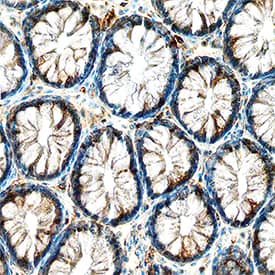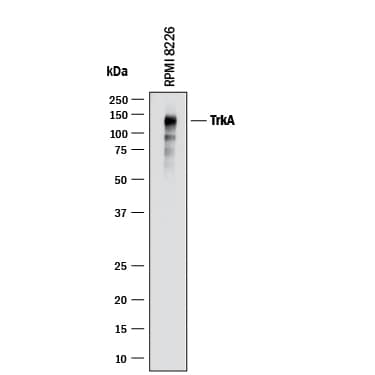Human TrkA Antibody
R&D Systems, part of Bio-Techne | Catalog # AF175

Key Product Details
Species Reactivity
Validated:
Cited:
Applications
Validated:
Cited:
Label
Antibody Source
Product Specifications
Immunogen
Ala33-Glu407
Accession # AAA36770
Specificity
Clonality
Host
Isotype
Endotoxin Level
Scientific Data Images for Human TrkA Antibody
Detection of Human TrkA by Western Blot.
Western blot shows lysates of RPMI 8226 human multiple myeloma cell line. PVDF membrane was probed with 1 µg/mL of Goat Anti-Human TrkA Antigen Affinity-purified Polyclonal Antibody (Catalog # AF175) followed by HRP-conjugated Anti-Goat IgG Secondary Antibody (Catalog # HAF017). A specific band was detected for TrkA at approximately 140 kDa (as indicated). This experiment was conducted under reducing conditions and using Immunoblot Buffer Group 1.TrkA in Human Colon.
TrkA was detected in immersion fixed paraffin-embedded sections of human colon using Goat Anti-Human TrkA Antigen Affinity-purified Polyclonal Antibody (Catalog # AF175) at 3 µg/mL overnight at 4 °C. Before incubation with the primary antibody, tissue was subjected to heat-induced epitope retrieval using Antigen Retrieval Reagent-Basic (Catalog # CTS013). Tissue was stained using the Anti-Goat HRP-DAB Cell & Tissue Staining Kit (brown; Catalog # CTS008) and counterstained with hematoxylin (blue). Specific staining was localized to cytoplasm in colon glands. View our protocol for Chromogenic IHC Staining of Paraffin-embedded Tissue Sections.Cell Proliferation Induced by beta-NGF and Neutralization by Human TrkA Antibody.
Recombinant Human beta-NGF (Catalog # 256-GF) stimulates proliferation in the TF-1 human erythroleukemic cell line in a dose-dependent manner (orange line). Proliferation elicited by Recombinant Human beta-NGF (5 ng/mL) is neutralized (green line) by increasing concent-rations of Goat Anti-Human TrkA Antigen Affinity-purified Poly-clonal Antibody (Catalog # AF175). The ND50 is typically 3-12 µg/mL.Applications for Human TrkA Antibody
CyTOF-ready
Flow Cytometry
Sample: K562 human chronic myelogenous leukemia cell line
Immunohistochemistry
Sample: Immersion fixed paraffin-embedded sections of human colon subjected to Antigen Retrieval Reagent-Basic (Catalog # CTS013)
Western Blot
Sample: RPMI 8226 human multiple myeloma cell line
Neutralization
Reviewed Applications
Read 1 review rated 5 using AF175 in the following applications:
Formulation, Preparation, and Storage
Purification
Reconstitution
Formulation
Shipping
Stability & Storage
- 12 months from date of receipt, -20 to -70 °C as supplied.
- 1 month, 2 to 8 °C under sterile conditions after reconstitution.
- 6 months, -20 to -70 °C under sterile conditions after reconstitution.
Background: TrkA
TrkA, the product of the proto-oncogene trk, is a member of the neurotrophic tyrosine kinase receptor family that has three members. TrkA, TrkB and TrkC preferentially bind NGF, NT-4 and BDNF, and NT-3, respectively. All Trk family proteins share a conserved complex subdomain organization consisting of a signal peptide, two cysteine-rich domains, a cluster of three leucine-rich motifs, and two immunoglobulin-like domains in the extracellular region, as well as an intracellular region that contains the tyrosine kinase domain. Two distinct TrkA isoforms that differ by virtue of a 6-amino acid insertion in their extracellular domain have been identified. The longer TrkA isoform is the only isoform expressed within neuronal tissues whereas the shorter TrkA is expressed mainly in non-neuronal tissues. NGF binds to TrkA with low affinity and activates its cytoplasmic kinase, initiating a signaling cascade that mediates neuronal survival and differentiation. Higher affinity binding of NGF requires the coexpression of TrkA with the p75 NGF receptor (NGFR), a member of the tumor necrosis factor receptor superfamily. NGFR binds all neurotrophins with low affinity and modulates Trk activity as well as alters the specificity of Trk receptors for their ligands. NGFR can also mediate cell death when expressed independent of Trk.
References
- Esposito, D. et al. (2001) J. Biol. Chem. 276:32687.
- Sofroniew, M.V. et al. (200) Annu. Rev. Neurosci. 24:1217.
Long Name
Alternate Names
Gene Symbol
UniProt
Additional TrkA Products
Product Documents for Human TrkA Antibody
Product Specific Notices for Human TrkA Antibody
For research use only


